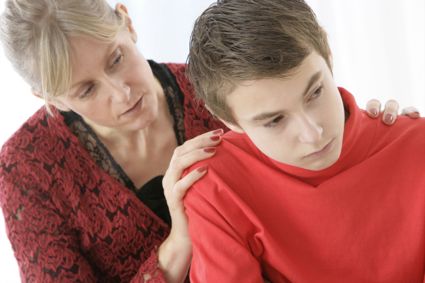By Michelle DeRamus, Ph.D.
Breaking off a romantic relationship is difficult at any age… Parents, here are some ideas about helping your child deal with a break up!
Breaking up is hard to do. Helping your child deal with a break-up is hard in a very different way. As parents, we want to protect our children and make their pain go away. Unfortunately, the older and more independent they get, the harder it can be to give that protection and remove that pain. Most parents want their children to eventually find happy, healthy relationships, but to reach that goal, almost all people go through a break-up (or two, or three…). While we cannot prevent this painful experience, we can help our children through the challenge of a break up by showing them LOVE.
L= Listen
One of the most helpful things a parent can do for a child going through a break-up is to be available. For some teens, this means being available to listen as they talk about what happened and how they feel about the break-up. Other teens may not want to talk about it with their parents, but they still may need support in other ways. If a teen does not want to talk, parents can be supportive and available by spending extra time with their teen doing other things, such as watching a movie, going on a walk, or playing ball together.
Even if teens don’t want to talk, the presence of a parent can be comforting. During this time it is especially important to be fully “present;” give your teen your undivided attention (i.e., no phone calls, texting, etc.). This will help them know they are important to you and you are truly available with your full support. Let them know they can talk to you about the break-up when (and if) they are ready.
O= Offer Support
 If a teen does want to talk, parents can be supportive by listening and acknowledging their pain. For example, saying things like, “I know you’re really hurting right now” or “It sounds like you’re dealing with a lot of different emotions” can be very helpful.
If a teen does want to talk, parents can be supportive by listening and acknowledging their pain. For example, saying things like, “I know you’re really hurting right now” or “It sounds like you’re dealing with a lot of different emotions” can be very helpful.
V= Veer away from minimizing the pain
It is usually not very helpful to say things like, “You’ll find someone else” or “It was only puppy love.” This can minimize a teen’s feelings. As adults we are better able to see the bigger picture, but to a teen, a break-up can be devastating. For many, this may be the first time they have experienced the loss of a significant relationship. It is also not typically helpful to join your teen in saying negative things about the ex. If parents say negative things about the ex, such as, “He was not good for you anyway,” it can make teens feel like their parents think they do not make good decisions. This can be particularly harmful if the couple gets back together.
E= Equip your child with coping skills by modeling them yourself
Finally, parents can help by modeling good coping skills. Staying involved in enjoyable activities, talking to friends and family, and taking good care of oneself physically (e.g., exercise, sleeping enough, eating healthy) are all good ways to get through a difficult time. If teens see their parents use these strategies when they experience difficult times, teens will be more likely to use them during a break-up.
When a child at any age is going through a hard time, whether it is a break up from a romantic relationship, loss of a friendship, or death of a loved one, he/she is going to experience grief at varying levels. As a parent, you must remember to LOVE your child through it:
Listen attentively
Offer support
Veer away from minimizing the pain
Equip your child with coping skills by modeling them yourself
Dr. DeRamus is a child psychologist with Preferred Medical Group and works at the Phenix City Children’s clinic. She specializes in Autism Spectrum Disorder (ASD) and provides diagnostic testing and therapy services for developmental delays, learning problems and ADHD. She also works with anger, anxiety, depression, family problems and peer relationships.



